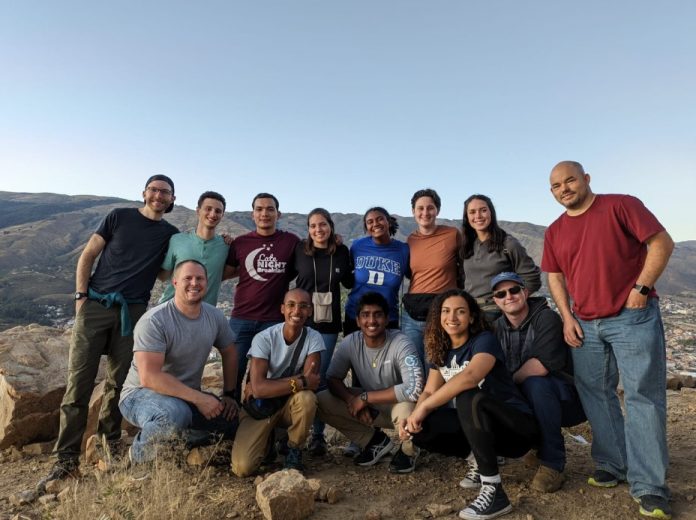USI “Engineers In Action” Chapter Helps Design And Build Pedestrian Bridge
September 15, 2022
Students representing the University of Southern Indiana chapter of Engineers in Action (EIA) spent six weeks, June 17 through the end of July, building a pedestrian bridge in Bolivia as part of a project with Duke University to connect isolated homesteads, including 300 adults and elementary students, to two schools, a health center, a farmer’s market and other necessities in the village.
Three USI students, led by Dr. Jason Hill, Associate Professor of Engineering, and Justin Amos, Lab Manager, traveled to Japo, Bolivia, and assisted in the construction of a pedestrian bridge spanning an 80-foot gorge. The former bridge on site was extremely dangerous to cross due to rainy seasons and frequent, swift currents in the area. The new 105-meter bridge was constructed at 14,300 feet of elevation in a remote area of the Andes Mountains.
“There was almost one year from project application to bridge inauguration,†says Xenia M. Adames Chanis, Project Manager and USI senior. “To me, this process meant having five weekly meetings, taking online courses, teaching, writing technical reports, giving presentations, and laughs and tears. While on campus, being the leader felt like an immense responsibility. In Japo, Bolivia, it felt like a blessing.â€
The pedestrian bridge was completed by Chanis, who served as Project Manager; sophomore Miguel A. Pinto Mendoza, who served as Cultural Relations Manager; and sophomore Josiah Hollis, who served as Quality Control Manager. Chanis and Mendoza both had Duke counterparts for the project, and Duke’s student team was comprised of seven students total. USI and Duke students coordinated on all aspects of the project.
All three students talked about the experience they received working on the project and how it will benefit their education and future careers. Chanis has already secured a position with Berry Global in Evansville while finishing classes. Mendoza plans to serve as Project Manager for the upcoming 2023 bridge building process. Hollis said he was honored to be a part of a project of this stature the summer after his freshman year—an experience he says he did not think he would have been able to find as an underclassman at another university.
Prior to arrival, students participated in design meetings and technical reviews with EIA instructors and project leaders. Financial support for the USI Bridge Project was provided by the USI Engineering Department within the Pott College of Science, Engineering, and Education.
“I am very proud of the incredible work completed by the student team,†Hill says. “Thanks to their leadership and dedication to this project, the Japo, Bolivia, community now has year-round access to critical resources.â€
During the six-week project, the team worked, ate, slept and socialized with the local community, learning the language and customs of its people. While cultural and language barriers presented challenges, they also provided opportunities to connect. “It’s so much more than building a bridge,†Amos says. “You immerse yourself in these communities and become a part of the culture. It’s an experience that is unmatched.â€
USI’s EIA chapter is a collegiate program of the larger EIA program that works with professionals to improve the lives of people in need through sustainable programs that build their capacity while also helping to develop global awareness among program participants.
In 2021, USI’s EIA chapter spent two weeks in West Virginia building a vehicular bridge to assist in rebuilding communities across the state damaged by high water events, including severe flooding in 2016 and 2017. The USI team was one of four teams participating in the larger EIA West Virginia Bridge Project, and the only team comprised of a single university. Other participating universities included Duke University, the University of Iowa, Cornell University, the University of Illinois at Urbana-Champagne, Rutgers University, Georgia Tech and Cal Poly. In 2019, USI students and faculty traveled to eSwatini in South Africa to participate in an EIA Bridge project mentoring experience, assisting Cornell University in the build of a 90-meter footbridge to allow villagers to safely cross a dangerous river. In 2023, the chapter plans to return to eSwatini or Bolivia for another bridge project.





